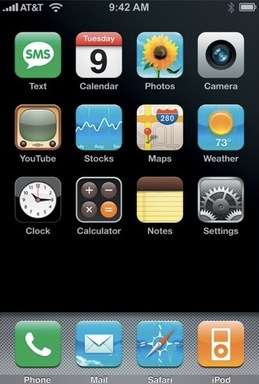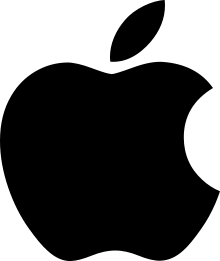iPhone OS 1
iPhone OS 1 is the first major release of iOS, Apple's mobile operating system. iPhone OS 1.1.5 is the last version of Apple's iPhone OS 1. This version of iOS was the first iteration of the touch-centric mobile operating system. No official name was given on its initial release; Apple marketing literature simply stated that the iPhone runs a version of Apple's desktop operating system, macOS, then known as Mac OS X.[1][2] On March 6, 2008, with the release of the iPhone software development kit (iPhone SDK), Apple named it iPhone OS[3] (they later went on to rename it "iOS" on June 7, 2010[4]). It was succeeded by iPhone OS 2 on July 11, 2008.
| A version of the iOS operating system | |
 | |
 iPhone OS 1.1 running on a first-generation iPhone | |
| Developer | Apple Inc. |
|---|---|
| Source model | Closed, with open source components |
| Initial release | June 29, 2007 |
| Latest release | 1.1.5 (4B1) / July 15, 2008 |
| Platforms | iPhone (1st generation) iPod touch (1st generation) |
| Kernel type | Hybrid (XNU) |
| Succeeded by | iPhone OS 2 |
| Official website | Apple - iPhone at the Wayback Machine (archived June 7, 2007) |
| Support status | |
| Unsupported | |
The iPhone OS 1.1.3 update cost $19.95 for iPod Touch users.[5]
Apps
Dock
- Phone
- Safari
- iPod
History
Introduction and initial release
iPhone OS 1 was introduced at the Macworld Conference & Expo keynote address by Steve Jobs on January 9, 2007, along with the original iPhone. At the time, Jobs only said the iPhone ran "OS X".
iPhone OS 1.0 was released, alongside the iPhone, on June 29, 2007.
Updates
1.0.1
iPhone OS 1.0.1 was released on July 31, 2007, as the first update to iPhone OS 1, with security fixes to Safari.[6]
1.0.2
iPhone OS 1.0.2 was released on August 21, 2007, with bug fixes.
1.1
iPhone OS 1.1 was released on September 14, 2007, with the first-generation iPod Touch; it was only available for the iPod Touch.
1.1.1
iPhone OS 1.1.1 was released on September 27, 2007, with support for the iTunes Music Store and other features,[7] and with security fixes.[8]
1.1.2
iPhone OS 1.1.2 was released on November 12, 2007.
1.1.3
iPhone OS 1.1.3 was released on January 15, 2008, with new features including:[9]
- support for rearranging icons on the home screen;
- support for creating Web Clips of web sites;
- the ability to play movies downloaded onto a Mac or PC from the iTunes store;
- support for sending text messages to a group;
- enhancements to Maps;
as well as security fixes.[10]
1.1.4
iPhone OS 1.1.4 was released on February 26, 2008. It included several bug fixes, and was the last version of iPhone OS 1 for the original iPhone.
1.1.5
iPhone OS 1.1.5 was released on July 15, 2008, for the iPod Touch only; it was the last version of iPhone OS 1.
Supported devices
References
- "iPhone – Features – OS X". Apple Inc. Archived from the original on October 6, 2007.
- "iPhone OS 1: The Beginning of an Era". Low End Mac. 2017-01-14. Retrieved 2019-08-10.
- Block, Ryan (March 6, 2008). "Live from Apple's iPhone SDK press conference". Engadget. Weblogs. Retrieved December 12, 2008.
- David Chartier (June 7, 2010). "iPhone OS gets new name, video calling". Macworld. Retrieved February 26, 2013.
- Philip Michaels. "iPod touch owners can add more apps—for a price". Macworld.
- "About the security content of iPhone v1.0.1 Update". Apple Support.
- Kim, Arnold (September 27, 2007). "Apple Releases iPhone 1.1.1 Update [Updated]". MacRumors.
- "About the security content of the iPhone 1.1.1 Update". Apple Support.
- "iPhone - January '08 Update". Archived from the original on February 3, 2008.
- "About the security content of iPhone v1.1.3 and iPod touch v1.1.3". January 15, 2008. Archived from the original on January 17, 2008.
